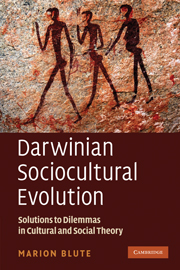Book contents
- Frontmatter
- Contents
- Preface: a postmodern metanarrative
- Acknowledgments
- 1 Introduction
- 2 History: where did something come from?
- 3 Necessity: why did it evolve?
- 4 Competition, conflict and cooperation: why and how do they interact socially?
- 5 The ideal and the material: the role of memes in evolutionary social science
- 6 Micro and macro I: the problem of agency
- 7 Micro and macro II: the problem of subjectivity
- 8 Micro and macro III: the evolution of complexity and the problem of social structure
- 9 Evolutionism and the future of the social sciences
- References
- Index
Preface: a postmodern metanarrative
Published online by Cambridge University Press: 05 June 2012
- Frontmatter
- Contents
- Preface: a postmodern metanarrative
- Acknowledgments
- 1 Introduction
- 2 History: where did something come from?
- 3 Necessity: why did it evolve?
- 4 Competition, conflict and cooperation: why and how do they interact socially?
- 5 The ideal and the material: the role of memes in evolutionary social science
- 6 Micro and macro I: the problem of agency
- 7 Micro and macro II: the problem of subjectivity
- 8 Micro and macro III: the evolution of complexity and the problem of social structure
- 9 Evolutionism and the future of the social sciences
- References
- Index
Summary
This book has three goals. This first is to acquaint colleagues in the social sciences and their students who may not be well informed, but who want to be become more so, about work currently being done in a variety of social science disciplines on Darwinian theories of sociocultural evolution. These are the readers who, when they hear “cultural evolution”, think “sociobiology”, or even of the kinds of stage theories of “progress” common in the nineteenth century and the first half of the twentieth century. Conversely, life scientists may be interested in the extent to which Darwinian evolutionary concepts and theories are applicable to purely sociocultural phenomena.
The second is addressed to colleagues in either the social or the life sciences and their students who know better and are currently working in this area. I would like them to become aware, to the extent to which they currently may not be, that their labours in their own discipline are supported by, and converging with, those of others, working in virtually every other social science discipline. Together they are building the foundations of a broad and inclusive theoretical framework for understanding in the social sciences. I would also like to encourage an enriched and updated understanding of evolutionary processes beyond the heretofore admittedly useful formulas such as those of replication, variation, interaction and selection many of us have been working within. Today, evolutionary biology has a richer conceptual apparatus to offer sociocultural evolutionists that we need to take advantage of.
- Type
- Chapter
- Information
- Darwinian Sociocultural EvolutionSolutions to Dilemmas in Cultural and Social Theory, pp. vii - viiiPublisher: Cambridge University PressPrint publication year: 2010



